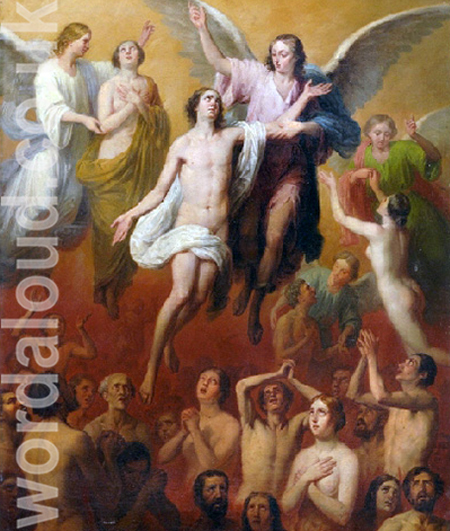Christian Art | Jesus Christ | They Crucified My Lord
Office Of Readings | Week 13, Wednesday, Ordinary Time | A Reading From The Way Of Perfection By Saint Teresa Of Avila | Thy Kingdom Come
‘Jesus Christ, thy kingdom come.’
Saint Teresa wrote during a period of profound spiritual and political upheaval in 16th-century Spain, amidst the Counter-Reformation and a Church in crisis. Her audience included not only cloistered nuns but a wider ecclesial community in need of reform and renewal. Her insight into prayer as intimate conversation with God stemmed from her personal experience of spiritual desolation, ecstatic union, and eventual peace in God. The call for the Kingdom to come ‘in us’ is not abstract: it is grounded in Teresa’s urgent desire that each soul be transformed into a sanctuary where God may reign.
Her comment that we are ‘the sort of people who cannot feel rich unless we feel the weight of the actual coins in our hand’ cuts to the heart of human insecurity. It also critiques the superficial piety that asks for generalised blessings without the interior commitment to welcome God’s will, even when it does not align with our preferences.
Theological Richness Of Saint Teresa’s Petition
The phrase ‘Thy Kingdom come’ appears simple but holds vast theological depth. Biblically, it refers to the coming of God’s reign both in history and at the end of time. In Teresa’s Carmelite spirituality, the Kingdom is also the inner reign of Christ in the purified soul. She draws from the mystical tradition that understands the human heart as the throne upon which God desires to reign.
In this sense, her explanation aligns with earlier Church Fathers such as Origen, who taught that the Kingdom comes when God reigns in the hearts of the faithful. Teresa makes the link between the sanctification of God’s name and the coming of the Kingdom. Without holiness in the believer, God’s name cannot be truly hallowed.
Saint Teresa’s reflection subtly integrates Pauline and Johannine theology: where Christ dwells, there is the Kingdom (Romans 14:17, Luke 17:21). Thus, Teresa’s Kingdom is one of joy, rest, and union, echoing the heavenly peace that surpasses understanding.
Mystical And Spiritual Development
The Kingdom is not just to be awaited but to be lived. Teresa presents the inner life as the soil in which God’s reign is established. Drawing from her own mystical experiences, she describes the soul that welcomes God’s Kingdom as one at peace, full of praise, and desiring only to love God.
This is not emotional escapism. Rather, it is the fruit of spiritual maturity. Teresa believes the soul that truly knows God cannot help but love Him. Her vision of the Kingdom is thus not only future-oriented but rooted in the present capacity of the soul for divine intimacy.
This echoes the theology of her contemporary, St John of the Cross, who taught that the soul becomes divinised through loving union with God. In the language of the mystics, the Kingdom has already come in the soul that is emptied of self-will and filled with God’s light.
Christianity Now | Love Revealed By Jesus Christ | Saint Teresa
Teresa’s insight that we need specific petitions because of our immaturity and tendency toward spiritual consumerism resonates deeply today. Many modern prayers can be vague or self-centred; Teresa invites us to test our desires: are we asking for what will help the Kingdom flourish within us, or simply for what makes us comfortable?
Her emphasis on detachment as a precondition for the Kingdom challenges a culture dominated by instant gratification and material wealth. To pray ‘Thy Kingdom come’ authentically means allowing God to dethrone our egos and reign in our choices, relationships, and hopes.
Finally, Teresa’s vision is profoundly hopeful. Though we may be attached, distracted, or imperfect, the Kingdom can still come in us. Prayer is not merely a request for blessings, but the shaping of the soul to receive and reflect God’s reign.

A Reading From The Way Of Perfection By Saint Teresa Of Avila | Thy Kingdom Come
What person, however careless, who had to address someone of importance, would not spend time in thinking how to approach him so as to please him and not be considered tedious? He would also think what he was going to ask for and what use he would make of it, especially if his petition were for some particular thing, as our good Jesus tells us our petitions must be. This point seems to me very important. Could you not, my Lord, have ended this prayer in a single sentence, by saying: ‘Give us, Father, whatever is good for us’? For, in addressing One Who knows everything, there would seem to be no need to say any more.
Eternal Wisdom! Between you and your Father this was quite sufficient. This is how you made your request of him in the garden of Gethsemane. You showed him what you wished for and what you feared, but left it all in his hands. But you know us, my Lord, and you know that we have not given ourselves up to the will of your Father as completely as you did. For us, it is best to pray for specific things, so that as each of them comes to mind we can pause to consider whether it is something good that we are asking for; so that if it is not, we should refrain from asking for it. Otherwise (being what we are, free will and all) we will not accept what God chooses to give us even if it is far better than what we asked for, simply because it is not exactly what we asked for. We are the sort of people who cannot feel rich unless we feel the weight of the actual coins in our hand.
Now the good Jesus bids us say these words, in which we pray that the Kingdom may come in us: Hallowed be thy name, thy Kingdom come. See how great our Master’s wisdom is! I am thinking of what it is we are asking for when we ask for the Kingdom: it is important that we should understand this. His Majesty saw that because of our weakness we could not hallow or praise or magnify or glorify the holy name of the Eternal Father in a way adequate to its greatness. We could not, that is, do it by ourselves, if His Majesty did not help us by giving us his kingdom here on earth. And so the good Jesus places these two petitions – Hallowed be thy name and Thy kingdom come next to each other, so that we can understand what we are asking for and why it is important to beg for it and to do all we can to please the one who is able to give it to us. Let me explain how I understand it.
Now, then. The greatest joy in the kingdom of heaven (the greatest among many) seems to me to be that we will no longer be tied up with earthly concerns but will have rest and glory within us – rejoicing that gives joy to everyone, peace that lasts for ever – satisfaction in ourselves, a satisfaction that comes from seeing how everyone is praising the Lord and blessing and hallowing his name, while no-one offends him. Everyone loves him. Each soul has no wish other than to love him: it cannot stop loving him because it knows him truly.
If only we knew him like that even here on earth, we would love him in the same way – not with that degree of perfection, of course, but in a very different way from the way we love him now.
Prayer With Jesus Christ And Saint Teresa Of Avila
Heavenly Father,
Your Son taught us to pray, ‘Thy kingdom come,’ not as distant hope but as a call to live in Your reign now.
May Your kingdom grow within our hearts, casting out all that does not honour You.
Give us the grace to seek first Your kingdom and its righteousness,
To welcome Your reign in our thoughts, our actions, and our desires.
Teach us to trust in Your will when it does not match our own.
Help us, like Teresa, to see the joy of heaven as the goal of our longing,
And to hallow Your name through lives of love, peace, and devotion.
Come, Lord, and reign in us.
Amen.
Glossary Of Christian Terms
Thy kingdom come – A petition in the Lord’s Prayer asking for God’s reign to be established in our hearts, our world, and ultimately in eternal life.
Eternal Wisdom – A title for Christ, especially when referring to His divine understanding and knowledge.
Garden of Gethsemane – The place where Jesus prayed before His Passion, expressing His human fear but surrendering to the Father’s will.
Majesty (His Majesty) – A reverent title used by St Teresa for God, emphasising His kingship and sovereign glory.
Free will – The capacity given by God to humans to choose their actions; it plays a key role in Teresa’s reflections on how we accept or resist God’s will.
Gethsemane prayer – The moment when Jesus says, ‘Not my will, but yours be done,’ which becomes a model of surrender for all Christians.
Coins in hand (metaphor) – St Teresa’s image of our human desire for tangible reassurance rather than spiritual trust; we often want something we can feel rather than accept unseen grace.
Hallowing God’s name – To praise and glorify God’s holiness, a theme paired with the coming of the kingdom in this petition of the Lord’s Prayer.
Mystical theology – A branch of theology focusing on the direct experience of God, a hallmark of St Teresa’s spirituality.
Rest and glory – A vision of heavenly peace and fulfilment, contrasting with the struggles and distractions of earthly life.








